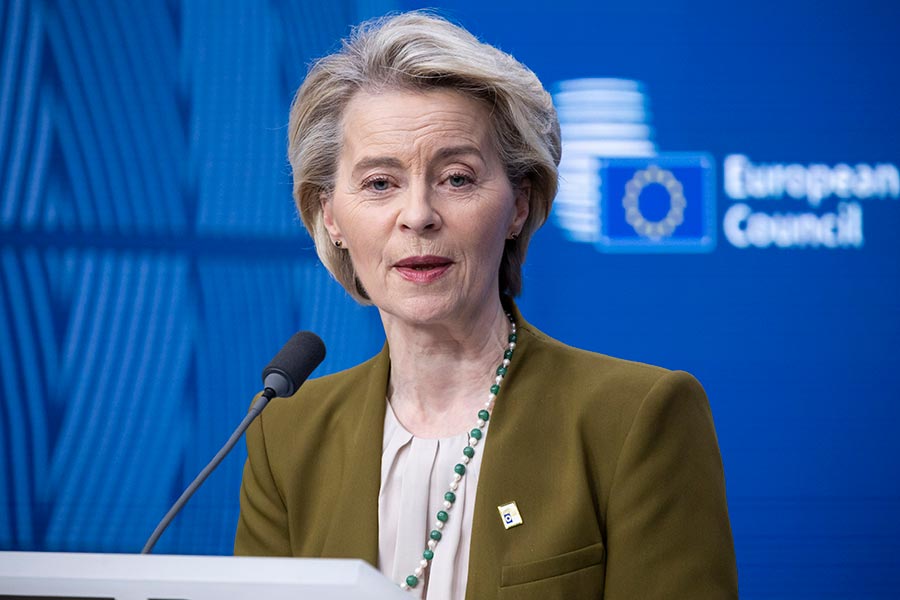EU Commissioner Ursula Von der Leyen has vowed to retaliate against Trump’s tariffs as Ireland prepares for the fallout from his trade war, writes Garreth MacNamee.
Ms Von der Leyen said yesterday the EU did not start the imminent trade war and held “a lot of cards”, as she warned President Trump the economic scrap was not in the interests of the US nor Europe.
Mr Trump has said America will implement tariffs on pharmaceutical products, singling out Ireland, ahead of what he calls “liberation day” today.
Trump is expected to target some of Ireland’s major employers as Taoiseach Micheál Martin said he wants to see negotiations emerge from the EU’s response.
Speaking in the EU parliament yesterday, Ms Von der Leyen said: “Let me be clear: Europe did not start this confrontation. We think it is wrong.
“We have everything we need to protect our people and our prosperity.
“We have the largest Single Market in the world. We have the strength to negotiate. We have the power to push back.
“And the people of Europe should know: together we will always promote and defend our interests and values. And we will always stand up for Europe.
“This confrontation is in no one’s interest.”
Throughout her speech, she insisted that the Commission’s goal would be a “negotiated solution” to prevent what is rapidly shaping up to be an all-out trade war, which analysts expect to have disastrous financial consequences.
“We would all be better off if we could find a constructive solution,” she added.
Tánaiste Simon Harris brought a memo to Cabinet yesterday outlining the scale of the potential impact on the Irish economy from US tariffs – highlighting that Ireland exports 32% of its goods to the America.
The Minister for Foreign Affairs and Trade told colleagues that Ireland must adopt a “calm and measured” approach in the coming days, emphasising the importance of showing “solidarity and unity” with the European Union.
Meanwhile, business experts have been handing out advice to Irish firms in a bid to advise them on how best to cushion the blow from the economic attacks.
Job losses from the tariffs are now likely in Ireland, consultancy group NFP warned.
Director Sinéad Cullen said: “With Trump liberation day approaching, Irish businesses are keeping a close eye on potential economic shifts, particularly in US trade policies and foreign investment.
“While the full impact remains uncertain, past experience shows changes to US taxation, trade, and multinational investment policies can have knock-on effects here.
“If the current administration prioritises US onshoring or corporate tax reforms, some multinationals may rethink their Irish operations, potentially leading to workforce restructuring.
“While certain sectors could face challenges, Ireland’s role as an EU hub may also present opportunities.
“Widespread redundancies aren’t a given, but some job losses are likely, especially as businesses navigate existing socio-economic pressures.
“Given these uncertainties, both employers and employees would do well to prepare for potential changes ahead.”
Government sources have said the EU is operating on the basis that a 20% blanket tariff will be applied to all EU countries, but a large amount of uncertainty remains on whether country specific tariffs will be applied.
Yesterday’s Cabinet meeting came on the back of meetings between the Tánaiste and fellow Trade and Foreign Affairs ministers from the Netherlands, Denmark and Croatia on Monday.
Micheál Martin has also said that he wants to see a “landing zone” agreed to enable companies and the economy to “enjoy a bit of stability”.
The Taoiseach said there will be “competing interests” across EU countries who will want to protect their own industries.
“It would be challenging to try and get a negotiating platform at European level in response to these tariff positions,” he said.

“First point, Europe doesn’t want tariffs. The European Union doesn’t but the US seems intent on imposing tariffs with a view to reshoring a lot of manufacturing to the US.
“That is the stated aim.
“But on the other hand, I think Europe will not immediately respond but take its time, and it’s in that period that the member states, working together, can be strategic in terms of how it responds.
“So a strategic response is very important, in other words, that we don’t invite more damage in response, and that we do it in a way that maximises Europe’s leverage here.”
Photo: President of the European Commission Ursula von der Leyen (Photo by Nicolas Economou/NurPhoto via Getty Images)











